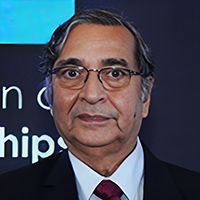 Connect Us
Connect Us

 Jul 06, 2023
Jul 06, 2023
Alarming observations have been made by international agencies dealing with renewable energy. ‘Global energy access gap persists: 675 million people without electricity, 2.3 billion people reliant on harmful cooking fuels’. These observations are warning signals for energy deficient countries – many of them in Africa. Reaching SDG 7 goals is a crucial effort and if governments fail that will have serious consequences.
A new report by the International Energy Agency (IEA), the International Renewable Energy Agency (IRENA), the United Nations Statistics Division (UNSD), the World Bank, and the World Health Organization (WHO), released on June 06, 2023, finds that the world is not on track to achieve the Sustainable Development Goal (SDG) 7 for energy by 2030.
2023 marks the halfway point for achieving SDGs by 2030. SDG 7 is to ensure access to affordable, reliable, sustainable and modern energy. The goal includes reaching universal access to electricity and clean cooking, doubling historic levels of efficiency improvements, and substantially increasing the share of renewables in the global energy mix. Attaining this goal will have a deep impact on people’s health and well-being, helping to protect them from environmental and social risks such as air pollution, and expanding access to primary health care and services.
The 2023 edition of Tracking SDG 7: The Energy Progress Report warns that current efforts are not enough to achieve the SDG 7 on time. There has been some progress on specific elements of the SDG 7 agenda – for example, the increased rate of using renewables in the power sector – but progress is insufficient to reach the targets set forth in the SDGs.
“The situation is alarming, and the decision to switch the entire world over to renewable energy needs to be carefully reconsidered.“
The global energy crisis is expected to stimulate the deployment of renewables and improve energy efficiency with several government policies pointing to increasing investment. However, the International Renewable Energy Agency (IRENA) estimates show that international public financial flows in support of clean energy in low and middle-income countries have been decreasing since before the covid-19 pandemic and funding is limited to a small number of countries. To meet SDG 7 targets and to ensure that people fully benefit from the socioeconomic gains of the shift to sustainable energy, it is necessary to structurally reform international public finance and define new opportunities to unlock investments.
The report also finds that mounting debt and rising energy prices are worsening the outlook for reaching universal access to clean cooking and electricity. Current projections estimate that 1.9 billion people will be without clean cooking and 660 million without electricity access in 2030 if we do not take further action and continue with current efforts. These gaps will negatively impact the health of our most vulnerable populations and accelerate climate change. According to WHO, 3.2 million people die each year from illness caused by the use of polluting fuels and technologies, which increase exposure to toxic levels of household air pollution.
Key findings of the Report
Observation by IRENA
Mr. Francesco La Camera, Director-General, International Renewable Energy Agency has observed that ‘Cost-competitive renewable energy has yet again demonstrated remarkable resilience, but the poorest in the world are still largely unable to fully benefit from it. To realise SDG 7 without compromising climate goals, we must bring about systemic change in the way international cooperation works. It is crucial that multilateral financial institutions direct financial flows more equitably around the world to support renewables deployment and related physical infrastructure development.’
Conclusion
The situation is alarming, and the decision to switch the entire world over to renewable energy needs to be carefully reconsidered. It is a matter of great concern to India which has large plans for use of renewable sources of energy for sustainable energy supply.

He is the Vice President of the Institute of Directors.
Owned by: Institute of Directors, India
Disclaimer: The opinions expressed in the articles/ stories are the personal opinions of the author. IOD/ Editor is not responsible for the accuracy, completeness, suitability, or validity of any information in those articles. The information, facts or opinions expressed in the articles/ speeches do not reflect the views of IOD/ Editor and IOD/ Editor does not assume any responsibility or liability for the same.
About Publisher

Bringing a Silent Revolution through the Boardroom
Institute of Directors (IOD) is an apex national association of Corporate Directors under the India's 'Societies Registration Act XXI of 1860'. Currently it is associated with over 30,000 senior executives from Govt, PSU and Private organizations of India and abroad.
View All BlogsMasterclass for Directors
Categories